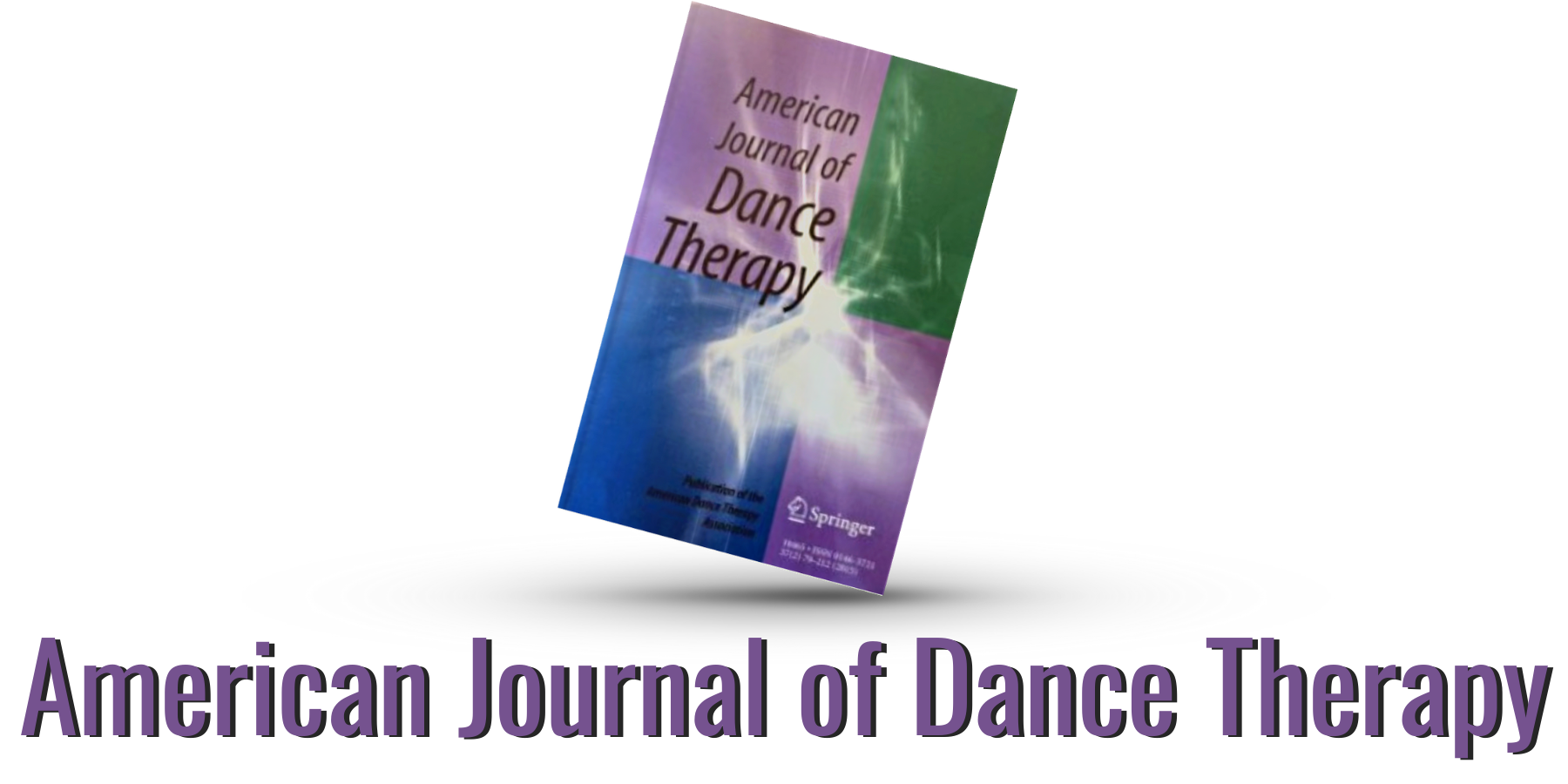|
|
||||||||||||||||
Announcing our co-editors of the American Journal of Dance Therapy! |
|||
 |
 |
||
|
Jenny Cobuzzi |
Rebekka Dieterich-Hartwell |
||
|
After finishing her undergraduate degrees in New York at Marymount Manhattan College in 2002, Jenny Cobuzzi (she/her) worked as a professional dancer which has taken her all over the globe. Jenny attended Antioch University New England and graduated with a Master’s degree in Dance/Movement Therapy and Counseling in 2013. From 2014-2017, Jenny served on the board of the New York chapter of the ADTA as the Programming Chair and is currently a thesis editor for Pratt University’s Creative Arts Therapy department since 2023. Passionate about sharing knowledge and utilizing the lens of community care, Jenny is excited to help shape the future of the journal. During her tenure in non-profit community mental health, she introduced and provided dance/movement therapy to the communities. Jenny was an early (pre-pandemic) and sustained advocate for telehealth and helped pioneer and expand accessibility for clients and clinicians alike. Jenny also spearheaded telehealth group work for the agency, exponentially increasing client’s access to services and aiding in skills development for colleagues. After over 12 years of working in community mental health, she is focused on private practice as a clinician, supervisor, consultant, and editor. Jenny has co-presented on dance/movement therapy regionally, nationally, and internationally and holds certifications in DBT, ACRA, and TF-CBT. Editing is the intersection of her love of reading, learning, evolving, staying current in the field, and helping people while fulfilling a meaningful role in progressing dance/movement therapy research. |
Rebekka Dieterich-Hartwell, PhD, BC-DMT, LPC (she/her) is a trauma specialist, researcher, author, and dance/movement therapist with 25 years of clinical experience. Originally from Germany and with a scientific background in microbiology, she is based in Philadelphia, PA. As the behavioral health therapist at the MossRehab Institute for Brain Health in Willow Grove, PA, an Avalon Action Alliance program, she serves veterans and first responders with mild to moderate traumatic brain injury and posttraumatic stress disorder. Rebekka is a research fellow in the Creative Arts Therapies Department at Drexel University in Philadelphia. Her research focuses on psychological trauma in diverse populations including veterans, refugees, survivors of torture, and historically underrepresented and oppressed groups and the specific beneficial effects of dance/movement therapy in their recovery. She is passionate about translational research (neuroscience and DMT) and is interested in understanding the combined healing effects of music and dance |
||
Submission Guidelines for Authors
General: Manuscripts, in English, should be submitted to the Editor’s Office via the journal’s web-based online manuscript submission and peer-review system: http://ajod.edmgr.com
Manuscript Submission: Inquiries regarding journal policy, manuscript preparation, and other such general topics should be sent to the co-editors:
Jenny Cobuzzi, CCS, LCPC, LCAT, LPC, BC-DMT Co-EditorRebekka Dieterich-Hartwell, PhD, BC-DMT, LPC , Co-Editor
Contact both co-editors at: [email protected]
The online system offers easy straightforward log-in and submission; supports a wide range of submission file formats [such as Word, WordPerfect, RTF, TXT, and LaTeX for manuscripts; TIFF, GIF, JPEG, EPS, PPT, and Postscript for figures (artwork)]; eliminates the need to submit manuscripts as hard-copy printouts, disks, and/or e-mail attachments; enables real-time tracking of manuscript status by author; and provides help should authors experience any submission difficulties.Manuscripts should be checked for content and style (correct spelling, punctuation, and grammar; accuracy and consistency in the citation of figures, tables, and references; stylistic uniformity of entries in the References section; etc.), as the typesetter is instructed to follow (accepted) manuscripts as presented. Page proofs are sent to the designated author for proofreading and checking. Typographical errors are corrected; authors’ alterations are not allowed.
Copyright
Submission is a representation that the manuscript has not been published previously and is not currently under consideration for publication elsewhere. A statement transferring copyright from the authors (or their employers, if they hold the copyright) to the American Dance Therapy Association is required. Upon commencement of typesetting, the contact author will receive an e-mail directing him/her to a webpage where the transfer-of-copyright form can be signed online. Such a written transfer of copyright, which previously was assumed to be implicit in the act of submitting a manuscript, is necessary under the U.S. Copyright Law in order for the publisher to carry through the dissemination of research results and reviews as widely and effectively as possible.
Manuscript Style
Type double-spaced using generous margins on all sides. The entire manuscript, including quotations, references, figure-caption lists, and tables, should be double-spaced. Number all pages consecutively with Arabic numerals, with the title page being page 1. In order to facilitate masked (previously termed “double-blind”) review, leave all identifying information off the manuscript, including the title page and the electronic file name. Appropriate identifying information is attached automatically to the electronic file. Upon initial submission, the title page should include only the title of the article.An additional title page should be uploaded as a separate submission item and should include the title of the article, author’s name (with degrees), and author’s affiliation. Academic affiliations of all authors should be included. The affiliation should comprise the department, institution (usually university or company), city, and state (or nation) and should be typed as a footnote to the author’s name. This title page should also include the complete mailing address, telephone number, fax number, and e-mail address of the one author designated to review proofs.- An abstract is to be provided, preferably about 100 words.
- A list of 3−5 keywords is to be provided directly below the abstract. Keywords should express the precise content of the manuscript, as they are used for indexing purposes.
- Illustrations (photographs, drawings, diagrams, and charts) are to be numbered in one consecutive series of Arabic numerals and cited in numerical order in the text. Photographs should be high-contrast and drawings should be dark, sharp, and clear. Artwork for each figure should be provided on a separate page. Each figure should have an accompanying caption. The captions for illustrations should be listed on a separate page.
- Tables should be numbered (with Arabic numerals) and referred to by number in the text. Each table should be typed on a separate page. Center the title above the table, and type explanatory footnotes (indicated by superscript lowercase letters) below the table.
- List references alphabetically at the end of the paper and refer to them in the text by name and year in parentheses. References should include (in this order): last names and initials of all authors, year published, title of article, name of publication, volume number, and inclusive pages. The style and punctuation of the references should conform to strict APA style – illustrated by the following examples: Journal Article Berrol, C. F., Ooi, W. L., & Katz, S. S. (1997). Dance/movement therapy with older adults who have sustained neurological insult: A demonstration project. American Journal of Dance Therapy, 19, 135–160. Book Shapiro, K. J. (1985). Bodily reflective modes: A phenomenological method for psychology. Durham, NC: Duke University Press. Contribution to a Book Goodill, S. W., & Cruz, R. F. (2004). Single-subject designs in clinical dance/movement therapy research. In R. F. Cruz (Ed.), Dance/movement therapists in action: A working guide to research options (pp. 92–108). Springfield, IL: Charles C Thomas Publisher.
- Footnotes should be avoided. When their use is absolutely necessary, footnotes should be numbered consecutively using Arabic numerals and should be typed at the bottom of the page to which they refer. Place a line above the footnote, so that it is set off from the text. Use the appropriate superscript numeral for citation in the text.
- In general, the journal follows the recommendations of the 2009 Publication Manual of the American Psychological Association (Sixth Edition), and it is suggested that contributors refer to this publication.
No Page Charges
The journal makes no page charges. Reprints are available to authors. Upon the commencement of typesetting, the contact author will receive an e-mail directing him/her to a webpage that provides reprint ordering information, including the current price schedules and where reprints can be ordered online.
Springer Open Choice
In addition to the normal publication process (whereby an article is submitted to the journal and access to that article is granted to customers who have purchased a subscription), Springer now provides an alternative publishing option: Springer Open Choice. A Springer Open Choice article receives all the benefits of a regular subscription-based article, but in addition, is made available publicly through Springer’s online platform SpringerLink. After acceptance and upon commencement of typesetting, the contact author will receive an e-mail directing him/her to a webpage that provides Springer Open Access ordering information, including the current price schedule, and where Springer Open Access can be ordered online. Payment must be received in full before publication or articles will publish as regular subscription-model articles. We regret that Springer Open Choice cannot be ordered for published articles.
For more information, please visit www.springeronline.com/openchoice







